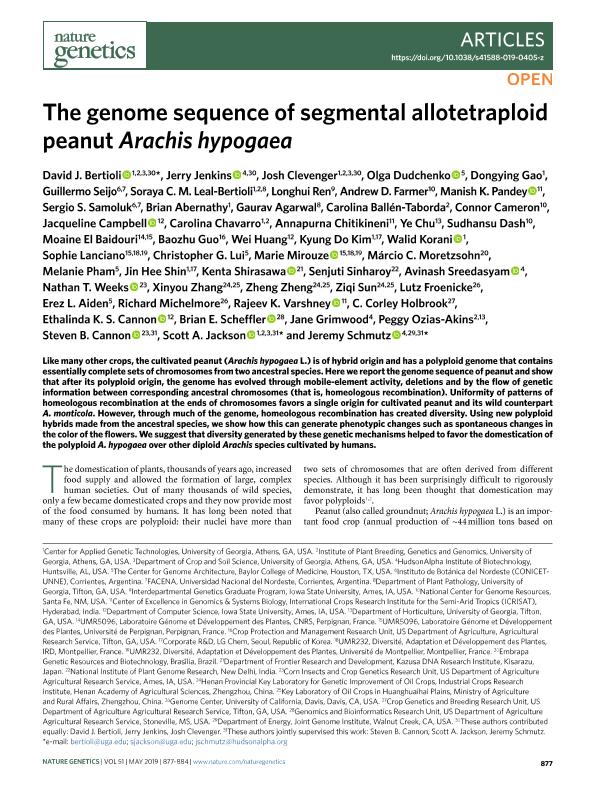Artículo
The genome sequence of segmental allotetraploid peanut Arachis hypogaea
Bertioli, David J.; Jenkins, Jerry; Clevenger, Josh; Dudchenko, Olga; Gao, Dongying; Seijo, José Guillermo ; Leal Bertioli, Soraya C.M.; Ren, Longhui; Farmer, Andrew D.; Pandey, Manish K.; Samoluk, Sergio Sebastián
; Leal Bertioli, Soraya C.M.; Ren, Longhui; Farmer, Andrew D.; Pandey, Manish K.; Samoluk, Sergio Sebastián ; Abernathy, Brian; Agarwal, Gaurav; Ballén Taborda, Carolina; Cameron, Connor; Campbell, Jacqueline; Chavarro, Carolina; Chitikineni, Annapurna; Chu, Ye; Dash, Sudhansu; El Baidouri, Moaine; Guo, Baozhu; Huang, Wei; Kim, Kyung Do; Korani, Walid; Lanciano, Sophie; Lui, Christopher G.; Mirouze, Marie; Moretzsohn, Márcio C.; Pham, Melanie; Shin, Jin Hee; Shirasawa, Kenta Shirasawa; Sinharoy, Senjuti; Sreedasyam, Avinash; Weeks, Nathan T.; Zhang, Xinyou; Zheng, Zheng; Sun, Ziqi; Froenicke, Lutz; Aiden, Erez L.; Michelmore, Richard; Varshney, Rajeev K.; Holbrook, C. Corley; Cannon, Ethalinda K. S.; Scheffler, Brian E.; Grimwood, Jane; Ozias-Akins, Peggy; Cannon, Steven B.; Jackson, Scott A.; Schmutz, Jeremy
; Abernathy, Brian; Agarwal, Gaurav; Ballén Taborda, Carolina; Cameron, Connor; Campbell, Jacqueline; Chavarro, Carolina; Chitikineni, Annapurna; Chu, Ye; Dash, Sudhansu; El Baidouri, Moaine; Guo, Baozhu; Huang, Wei; Kim, Kyung Do; Korani, Walid; Lanciano, Sophie; Lui, Christopher G.; Mirouze, Marie; Moretzsohn, Márcio C.; Pham, Melanie; Shin, Jin Hee; Shirasawa, Kenta Shirasawa; Sinharoy, Senjuti; Sreedasyam, Avinash; Weeks, Nathan T.; Zhang, Xinyou; Zheng, Zheng; Sun, Ziqi; Froenicke, Lutz; Aiden, Erez L.; Michelmore, Richard; Varshney, Rajeev K.; Holbrook, C. Corley; Cannon, Ethalinda K. S.; Scheffler, Brian E.; Grimwood, Jane; Ozias-Akins, Peggy; Cannon, Steven B.; Jackson, Scott A.; Schmutz, Jeremy
 ; Leal Bertioli, Soraya C.M.; Ren, Longhui; Farmer, Andrew D.; Pandey, Manish K.; Samoluk, Sergio Sebastián
; Leal Bertioli, Soraya C.M.; Ren, Longhui; Farmer, Andrew D.; Pandey, Manish K.; Samoluk, Sergio Sebastián ; Abernathy, Brian; Agarwal, Gaurav; Ballén Taborda, Carolina; Cameron, Connor; Campbell, Jacqueline; Chavarro, Carolina; Chitikineni, Annapurna; Chu, Ye; Dash, Sudhansu; El Baidouri, Moaine; Guo, Baozhu; Huang, Wei; Kim, Kyung Do; Korani, Walid; Lanciano, Sophie; Lui, Christopher G.; Mirouze, Marie; Moretzsohn, Márcio C.; Pham, Melanie; Shin, Jin Hee; Shirasawa, Kenta Shirasawa; Sinharoy, Senjuti; Sreedasyam, Avinash; Weeks, Nathan T.; Zhang, Xinyou; Zheng, Zheng; Sun, Ziqi; Froenicke, Lutz; Aiden, Erez L.; Michelmore, Richard; Varshney, Rajeev K.; Holbrook, C. Corley; Cannon, Ethalinda K. S.; Scheffler, Brian E.; Grimwood, Jane; Ozias-Akins, Peggy; Cannon, Steven B.; Jackson, Scott A.; Schmutz, Jeremy
; Abernathy, Brian; Agarwal, Gaurav; Ballén Taborda, Carolina; Cameron, Connor; Campbell, Jacqueline; Chavarro, Carolina; Chitikineni, Annapurna; Chu, Ye; Dash, Sudhansu; El Baidouri, Moaine; Guo, Baozhu; Huang, Wei; Kim, Kyung Do; Korani, Walid; Lanciano, Sophie; Lui, Christopher G.; Mirouze, Marie; Moretzsohn, Márcio C.; Pham, Melanie; Shin, Jin Hee; Shirasawa, Kenta Shirasawa; Sinharoy, Senjuti; Sreedasyam, Avinash; Weeks, Nathan T.; Zhang, Xinyou; Zheng, Zheng; Sun, Ziqi; Froenicke, Lutz; Aiden, Erez L.; Michelmore, Richard; Varshney, Rajeev K.; Holbrook, C. Corley; Cannon, Ethalinda K. S.; Scheffler, Brian E.; Grimwood, Jane; Ozias-Akins, Peggy; Cannon, Steven B.; Jackson, Scott A.; Schmutz, Jeremy
Fecha de publicación:
05/2019
Editorial:
Nature Publishing Group
Revista:
Nature Genetics
ISSN:
1061-4036
e-ISSN:
1546-1718
Idioma:
Inglés
Tipo de recurso:
Artículo publicado
Clasificación temática:
Resumen
Like many other crops, the cultivated peanut (Arachis hypogaea L.) is of hybrid origin and has a polyploid genome that contains essentially complete sets of chromosomes from two ancestral species. Here we report the genome sequence of peanut and show that after its polyploid origin, the genome has evolved through mobile-element activity, deletions and by the flow of genetic information between corresponding ancestral chromosomes (that is, homeologous recombination). Uniformity of patterns of homeologous recombination at the ends of chromosomes favors a single origin for cultivated peanut and its wild counterpart A. monticola. However, through much of the genome, homeologous recombination has created diversity. Using new polyploid hybrids made from the ancestral species, we show how this can generate phenotypic changes such as spontaneous changes in the color of the flowers. We suggest that diversity generated by these genetic mechanisms helped to favor the domestication of the polyploid A. hypogaea over other diploid Arachis species cultivated by humans.
Palabras clave:
ARACHIS HYPOGAEA
,
GENOME
,
SEGMENTAL ALLOTETRAPLOID
Archivos asociados
Licencia
Identificadores
Colecciones
Articulos(IBONE)
Articulos de INST.DE BOTANICA DEL NORDESTE (I)
Articulos de INST.DE BOTANICA DEL NORDESTE (I)
Citación
Bertioli, David J.; Jenkins, Jerry; Clevenger, Josh; Dudchenko, Olga; Gao, Dongying; et al.; The genome sequence of segmental allotetraploid peanut Arachis hypogaea; Nature Publishing Group; Nature Genetics; 51; 5; 5-2019; 877-884
Compartir
Altmétricas



